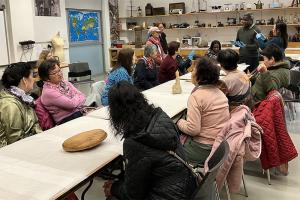
The NI Museums Council, in partnership with National Museums NI and the African Caribbean Support Organisation of NI, launched a pioneering guidance document on decolonisation. Unveiled at the Museum Association NI Member’s Meeting during summer 2024, this resource represents a significant advance in promoting inclusive narratives and cultural representation across Northern Ireland’s museums and beyond.
A Collaborative Legacy of the Decolonisation Partnership Project
This guidance document is a key outcome of the Global Voices, Local Choices partnership project, a collaborative initiative that engaged migrant communities to explore and challenge the colonial narratives traditionally presented in museum collections. Local museums across Northern Ireland played a crucial role in this project by opening their doors to these communities. This initiative provided opportunities for participants to creatively respond to pieces from the National Museums NI World Cultures collection, fostering deeper connections between museums and diverse audiences. The result has been a richer, more inclusive cultural landscape, where fresh perspectives on historical collections have been encouraged and celebrated. Partners are extremely grateful for the funding and support of an Esmee Fairbairn grant via the Museums Association to plan and deliver this project.
Shaped by Community Voices and Evaluative Insights
The development of the guidance document was informed by a comprehensive evaluation report conducted by external evaluators. Feedback from both museum professionals and community participants ensured that the document reflects a wide range of perspectives and experiences. Marginalised communities were central to this process, offering invaluable insights that shaped the content and direction of the guidance.
A representative from the African Caribbean Support Organisation of NI highlighted the importance of this inclusive approach: “This project has allowed us to bring the voices of our communities into spaces where they have historically been excluded. The guidance document is a testament to the power of collaboration and the impact of truly listening to and valuing diverse perspectives.”
Expanding the Reach of Decolonisation Work
While the guidance document was developed with museums in mind, its approaches and methodologies are designed to be adaptable across various contexts. The project has demonstrated that the principles of decolonisation can be effectively applied in sectors such as education and community outreach. Local museums are encouraged to explore how their collections can facilitate decolonisation work, using the diverse artifacts they house to challenge historical narratives and foster a more inclusive understanding of history and culture.
“We’ve seen firsthand how local museums can play a vital role in this work,” said a representative from Northern Ireland Museums Council. “Their collections are not just historical artifacts; they are powerful tools for education and dialogue, especially when used to engage with marginalised communities.”
Engaging with the Guidance Document
The newly launched guidance document is now available for download and is expected to be an essential tool for organisations looking to embark on or deepen their decolonisation efforts. It offers practical advice, case studies, and reflective insights, all informed by the experiences of local museums and the communities they serve.
Organisations and individuals interested in learning more or seeking support in their decolonisation work can access the document through the Resources/Case Studies section of the NI Museums Council’s website. This launch marks a pivotal moment in Northern Ireland’s journey towards a more inclusive and representative cultural landscape, underscoring the vital role that local museums and marginalised communities play in this ongoing process.
View the Document
For more information and to download the document, please visit the partner’s websites: